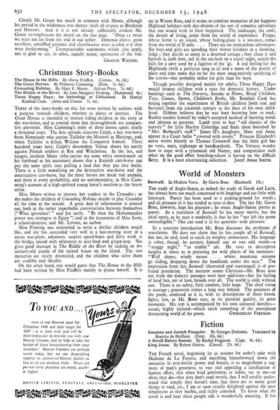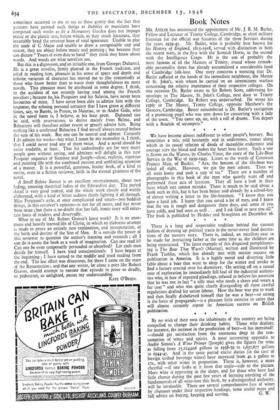Fiction
Suzanne and Joseph Pasquier. By Georges Duhamet. Translated by Beatrice de Holthoir. (Dent. 10s. 6d.) THE French novel, beginning let us assume for order's sake with Madame de La Fayette, and marching henceforward down the centuries in ever-fertile power and beauty, is so magnificent a seg- ment of man's greatness, so vast and appealing a justification of human effort, that when kind gentlemen, or ladies, say to me—as often they do—that they don't read novels, that I will readily under- stand that simply they haven't time, that there are so many good things to read, etc., I am at once cruelly delighted against tlit poor simpletons as they burble, and richly consoled. To know what the novel is and hear these people talk is wonderfully amusing. It has
sometimes occurred to me to say to these gentry that the fact that painters have painted such things as Bubbles or musicians have composed such works as In a Monastery Garden does not impugn music or the plastic arts, before which, as they insult literature, they invariably bend the reverent knee of total ignorance. Unable to play the scale of C Major and unable to draw a recognisable cup and saucer, they are abject before music and painting ; but because they can dictate " Yours of even date to hand " they think they know about words. And words are what novelists use.
But this is a digression, and an irritable one, from Georges Duhamel. He is a great novelist, firmly planted in the French •tradition, and relief in reading him, pleasure in his sense of space and depth and infinite variation of character has moved me to jibe contentedly at those who know better than to waste their thoughtfulness on mere novels. This pleasure must be attributed in some degree, I think, to the accident of not recently having read among the French novelists ; because he, his Pasquiers and his Salavin, have never been favourites of mine. I have never been able to admire him with the response, the echoing personal certainty that I have given at different times, say, to Barren, to Proust, to Mauriac, or to Andre Gide, who in the novel form is, I believe, at his least great. Duhamel can be said, with reservations, to derive mainly from Balzac, and Balzaciens will therefore either resent or greatly admire him. Being nothing like a confirmed Balzacien I find myself always neutral before the sum of his work. But one can be neutral and admire. Certainly I do admire his works—but what I mean by my neutrality is, I think, that I could never read any of •them twice. And a novel should be twice readable, at least. That his undoubtedly are for very many people goes without saying, and admirers will delight in this new Pasquier sequence of Suzanne and Joseph—close, realistic, vigorous and painting life with the combined passion and unblinking attention of a master. It is a powerful, generous, brainy book, of a kind to revive, even in a fiction reviewer, faith in the eternal greatness of the novel.
A Stroll Before Sunset is an excellent entertainment, about two fading, amusing theatrical ladies of the Edwardian day. The period detail is very good indeed, and the whole work closely and wittily elaborated, with a kind of bitter sadness thinly lighting it all through. Miss Ferguson's style, at once complicated and smart—two baddish things, in this reviewer's opinion—is not for all tastes, and has never been mine ; but there is no doubt that her full, ironic story will enter- tain hosts of readers, and deservedly.
What to say of Mr. Robert Graves's latest work? It is an enor- mous and heavily learned life of Christ, in which an elaborate attempt is made to prove an entirely new explanation, and interpretation, of the birth and destiny of the Son of Man. It is outside the power of this reviewer to question the author's learning and research ; all I can do is assess the book as a work of imagination. Can one read it? Can one be even temporarily persuaded or absorbed? Let each man decide for himself. I have tried conscientiously. I have begun at the beginning ; I have turned to the middle and tried reading from the end. The last effort was disastrous, for there I came on the story of the Resurrection ; and that any writer, let alone a poet like Robert Graves, should attempt to narrate that episode in prose so deadly, so pedestrian, so unlighted, passes my understanding.



































 Previous page
Previous page